December 11, 2009, - 4:32 pm
Happy Chanukah: Still No Modern Maccabees; My Cool Menorah Collection
As I write this, the Jewish holiday of Chanukah is soon to begin–as all Jewish holidays do–at sundown.
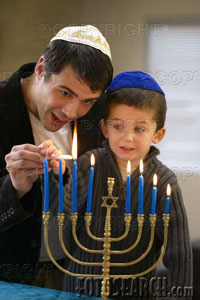
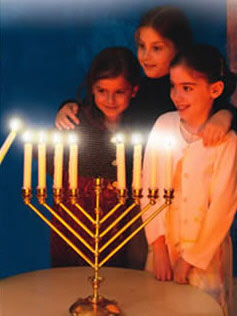
Chanukah, the Jewish Festival of Light, is the story of miracles on so many levels, miracles Jews remember during this eight-day holiday, every year. But, unlike other Jewish holidays, part of our observance of this holiday is to publicize the miracles of Chanukah to the public by lighting our menorahs (plural is actually “menorot”)–the Chanukah candelabras–in our window or front door for the world to see.
We celebrate and let the world know the miracle that a small band of Jewish warriors, the Maccabees, were able to defeat the Greek-Syrian soldiers of King Antiochus, who far outnumbered them. We celebrate that a jar of oil that would only last one day, lasted eight and lit the holy Jewish Temple that had been theretofore been desecrated, until a new jar of oil was ready to keep the Temple lit.
But the Menorah and the holiday mean even more to me and those I’ve met in my life. As a grad student at the University of Wisconsin, I became friends with a Russian Jewish immigrant, Dmitry. Dmitry, from a poor Jewish family near Siberia, was sold into slavery by a Russian businessman. As a student at a university, he was regularly beaten up by his fellow students for being Jewish. Soon, a Russian businessman promised his professors at the university that he had a great opportunity for him in the United States. When Dmitry reached the airport in America, he was met by a Wisconsin farming family who brought him to their house, only let him shower once a week and paid him $20 a month. The family constantly asked him if he was a Jew, but he never admitted it, fearing he’d be beaten like he was in the former Soviet Union.
Dmitry was used to Soviet oppression and didn’t understand that Jews, like everyone else, had rights in America. One day he escaped the farm and took a bus to Madison, Wisconsin, where he did odd jobs trying to survive. He lived across the hall from Jewish students in a dumpy apartment building. When Chanukah came, he saw their lit menorahs (menorot) in their windows and he finally realized that he could be freely and openly a Jew in America. Dmitry became a U.S. citizen and with the help of the Chabad movement of Judaism, and the righteous Rabbi Yonah Matusof of the Chabad Madison Jewish Center, that he soon became a successful businessman and always, thereafter, a proud American and a proud Jew.
It was the lights of the Chanukah menorah–proclaiming to the world that we are Jews an proud of our history, heritage, and victory over the Greek-Syrians–which freed Dmitry from his fears of oppression and his secret that he was a Jew.
Here are some pics of some of my favorite menorahs (menorot) from my own collection. I’m using a new camera (I lost my trusty old one), and I didn’t use enough lighting so bear with me. These menorot, to me, speak to the modern meaning of Chanukah. And you, too, can own two of these.
The first is a cool menorah with Israeli Defense Forces F-16s (or is it F-15s? not sure), tanks, and helicopters. The planes, on metal rods, rotate around. It’s called the “Israeli Army Menorah ELARMY Menorah” and is designed by artist Reuven Masel. The second one is my favorite and is called “IDF Chaverim [Hebrew for “Friends”]
,” and shows Israeli soldiers praying at the Western Wall, the holiest site in Judaism. It’s designed by Uri Kaufman. The third is an old Kurdish menorah I bought from a Kurdish Jew in the Machaneh Yehudah Market of Jerusalem. The “Hamzah” [“Five”] hand symbol is a good luck symbol in Judaism (and to Muslim Arabsl). It’s not a kosher menorah because the ninth prong, the “shamash,” isn’t higher than the others (more on that below). But I like it, anyway, and don’t use it for the lighting ceremony.
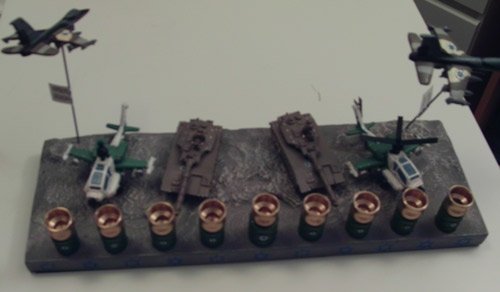
Get Yours . . .
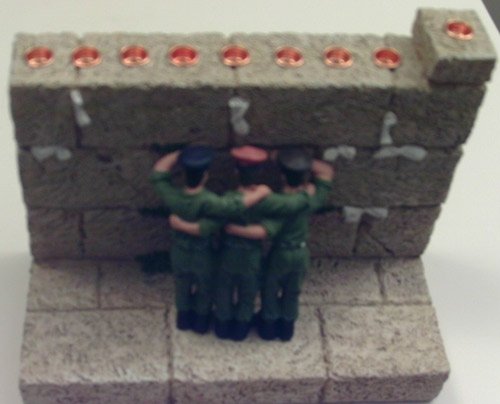
Get Yours . . .

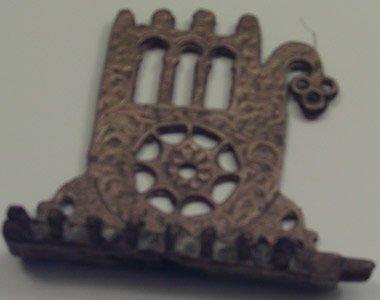
Here is more of the Chanukah story from some of my previous posts:
Chanukah is the story of the few against the many–the few Maccabees, led by Matthew [Matityahu, and then, after his death, Matthew’s son, Judah [Yehudah], who fought against oppression by Greek-Syrian King Antiochus Epiphanes and miraculously beat him and his army, which far outnumbered the Jews. It’s the story of the one jar of olive oil which mirculously lasted eight days–the amount of time it took to make more jars–in lighting the menorah [candelabra] in the Jewish Temple in Jerusalem. All other jars had been destroyed or made impure by the Greeks, and it was the one jar that miraculously survived intact. Above all, Chanukah is about the age-old, repeat fight of the Jewish people for religious freedom.
As we Jews face a bleak future with Islamic extremism and violence on the rise, we also face an enemy within, just as the Jews and their Maccabees fought in their own community back in the day. The Hellenists were Jews who wanted to forsake Judaism for the secularism of the Greeks. Today, those same Jews are the ones who’ve forsaken Judaism for liberalism. They’re the ones who voted for Barack Obama, the ones who continue to pander and “outreach” to our avowed enemies in the Islamic community. I’ve written about so many of them on this site over the years, and their names need not be mentioned on this holiday. We know who they are. And their views must be crushed, just as the Maccabees crushed Jewish Hellenism.
I asked, last year, where are all the Maccabees? I still haven’t found them. There are scant few among my fellow co-religionists willing to fight for the West’s survival, and far too many who run like Roger Bannister to kiss the feet of Muslim extremists in our commmunities in America.
I’m not suggesting violence, as the Maccabees needed to engage in. But it must be remembered that the most bloody fights and slaughters the Maccabees had to carry out were not those of their Greek-Syrian enemies, but those of their fellow Jews, whose behavior could have meant the end of Judaism. The Maccabees showed no mercy toward these ignoramuses who embraced the enemy, toward these eager sell-outs.
Sadly, we have plenty of those types of Jews dominating my religion, today, and since there are no Maccabees, we see the results in the shrinking number of Jews worldwide. Jews who leave the religion and/or who bend over backward (and forward) to supporters of Islamic terrorism tend to be–with a few exceptions–very liberal Jews and/or their kids. . . . They would have been among the carnage necessary for the Maccabees’ miraculous victory.
And so I recognize and remember all of this as I light, tonight, the first of eight candles on my Channukah menorah, marking each night of this joyous holiday. Tomorrow night, I’ll light two candles, marking the second night, and so on. The ninth candle, the shamash, is used to light the other eight. It is required to be elevated in height from the other eight candles, which are supposed to be uniform in height on a kosher menorah.
A few notes on Channukah: Contrary to what Hallmark and American Greetings and Best Buy would have you believe, it is not–as I’ve noted here many times–a major Jewish holiday. That’s why, unlike on important Jewish holidays, we Jews can work [on the holiday]. I only do not work while my Channukah candles–which are required to burn for a half hour–are lit up. Channukah has only become important, here in America, because of weak, ignorant Jewish parents who cannot explain to their kids that we don’t have a Christmas or a holiday at the same time of the year that is as important to us as Christmas is to Christians. This is largely a phenomenon of Jewish immigration to America.
Speaking of Hallmark, I’m often asked why the name of this Jewish holiday is spelled a gazillion different ways, especially on greeting cards. That’s because of English transliteration from Hebrew. It begins with a “Ch” sound, which is similar to the noise you get from clearing your throat. It’s not an “h” sound, but most Gentiles–and now, many Jews–are unable to pronounce the “ch” sound. As for the two “n”s or two “k”s, those are irrelevant, as it’s all about transliteration and phonetics. There is no right way to spell “Channukah” in English.
We play a game with a spinning top, called a dreidel. The dreidel has a different of four Hebrew letters on each side, which are the initials for a Hebrew phrase, Nes Gadol Hayah Sham, which means, “A Big Miracle Happened There [Here, if you’re in Israel].” (Ironically, Bed, Bath & Beyond sells a gold-colored dreidel, bearing a carving of the mosque on top of the Jewish Temple Mount. HUH?!)
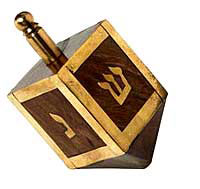
Chanukah Dreidel
The eight gifts thing–or even one Chanukah gift–is really not part of Chanukah, either. It’s also part of the incorrect “Just like Christmas” phenomenon. In Europe, traditionally people gave gold coins–called “Channukah gelt”–and ate fried potato pancakes, called latkes. In Israel, they eat sufganiyot, jelly donuts. Jews in America tend to eat both of these on Channukah.
The bottom line is that, no matter how Chanukkah is celebrated by various Jews around the world, it is about Jews–with all odds against them–vanquishing their enemies, both their enemies without and within. And I note again, today that enemy is Islam and Muslims and the stupid Jewish liberals who love them. We have not chosen to fight them. They are self-appointed.
Too many self-appointed Hellenists, too. Not enough Maccabees.
On the bright side, as with all enemies of the Jewish people, with all odd against us, we defeated the Greeks and Antiochus. I’m hopeful we’ll defeat Islam eventually, too.
Like I said, Chanukah is about the few beating the many. And miracles.
And finally, I’ll repeat a message I posted last year from my friend Ruth S. King of Americans for a Safe Israel and a great patriot. I second her emotion:
I’m never a hundred percent sure of how to spell it, but I do know that it is a holiday of triumph of good versus evil and Jews versus their oppressors. May you and all those you love have a healthy and wonderful holiday. May we prevail over the millions of enemies we have. May America and Israel survive in strength, deterrence and determination. And, a special thanks to those not of our faith whose friendship and support are crucial and inspiring.
Amen.
To my Jewish friends and readers, I wish you a Happy Chanukah, and to my other friends and readers, I hope this explained this fun and auspicious holiday to you. Thanks to all of you for being vigilant and helping to fight the modern-day Hellenists. And thanks to all of you who sent me Chanukah greetings and good wishes. Right back at ya!
***
From Shraga Simmons and Shimon Apisdorf at Matityahu’s Revolt:
The name “Maccabee” is an acronym for the [Biblical] verse “Who is compared to You among the mighty, oh Lord” (Exodus 15:11).
***
More on Chanukah from Judaism 101, Matityahu’s Revolt, and the Constantia Hebrew Congregation of Capetown, South Africa.
Chag Chanukah Sameach–Happy Chanukah!
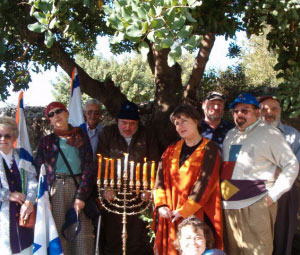
Temple Mount Faithful Light Chanukah Menorah in Israel (Part of the Jewish Temple–the most holy part–has a mosque built on top of it.)
Tags: Antiochus, Antiochus Epiphanes, Antiochus Epiphanies, Assyrians, Channukah, Chanukah, Chanukkah, Chaverim Menorah, Cool Menorahs, dreidel, ELARMY Menorah, Greek-Assyrians, Greek-Syrian, Hannukah, Hanukah, Hanukkah, Haverim Menorah, Hellenism, Hellenists, IDF menorah, Israel, Jewish Festival of Light, Jewish Festival of Lights, Jewish Temple, King Antiochus, latkes, Maccabee, Maccabees, menora, menorah, menorahs, menorot, Reuven Masel, Shamash, sufganiyot, Syrian-Greek, Temple, Uri Kaufman


Happy Chanukah, Debbie. I’m so happy I have found your site. You have enlightened me already. May GOD bless you.
Uncle Jack from GA on December 14, 2009 at 1:00 pm